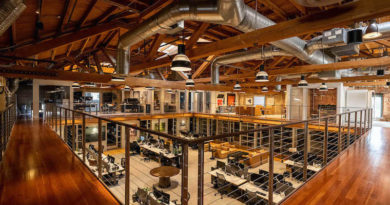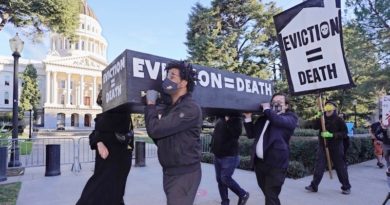Daily Business Report-Feb. 9, 2015
The Basement at UC San Diego is where budding entrepreneurs work to develop products.
UC San Diego Opens Basement
To Budding Entrepreneurs
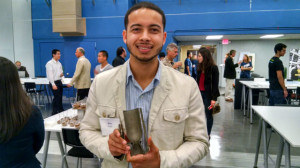
Silicon Valley may have its garages, but UC San Diego is countering with The Basement, opening up 3,000 square feet beneath Mandeville Center for the university’s budding entrepreneurs.
The space will be used for workshops, boot camps and offices for 20 student-led startups, and the university hopes to create a pipeline to San Diego’s more established technology innovators.
“I’m expecting a lot from this group and this space,” said Dr. Suresh Subramani, executive vice chancellor for academic affairs.
Subramani spoke as students and graduates toured the space on Friday and quizzed some of the teams about their products. On the walls were posters of some of UCSD’s successful alumni entrepreneurs, including GoPro founder Nick Woodman.
Alex Finch, a senior and co-founder of Tri-D Dynamics, showed off a rocket engine made with a 3D printer. The prototype engine is printed from cobalt chromium and a successor will be made from the nickel alloy Inconel.
Emma He, a student at the Rady School of Management, is launching eCupofTea, an app for selling and locating parking spaces.
The university’s basement initiative comes amid a flowering of incubators in San Diego, including EvoNexux, Connect, Fab Lab San Diego, The Moxie Center at UC San Diego and the Zhan Innovation Center at San Diego State
“The overall energy is the important thing, so the more incubators, the better,” said Jeff Belk, a 1983 UCSD graduate and one of the alumni behind the basement project.
— By Times of San Diego
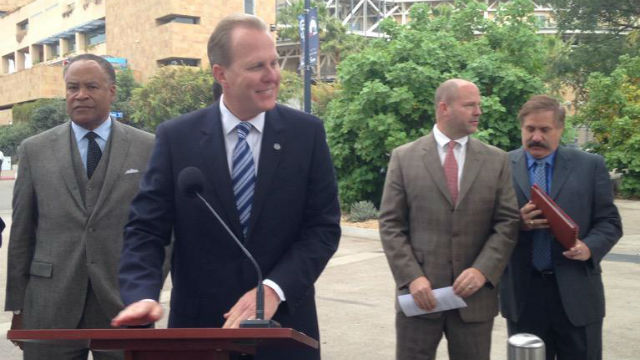
Chargers Stadium Task Force
To Schedule an Open Forum
Bowing to pressure from some individuals, including two City Council members, Mayor Kevin Faulconer’s stadium task force announced Friday that it will hold a public forum to receive public input on a plan to build a new stadium for the San Diego Chargers.
The date of the forum has not been determined, advisory group spokesman Tony Manolatos told City News Service.
The nine-member group held its first meeting Friday and selected Adam Day as chairman. Day is a Sycuan tribal official and a California State University trustee.
Day pledged to give “regular updates so San Diegans are apprised of the process” of selecting a stadium site and way to finance it, Manolatos said.
Faulconer announced the formation of the task force at his “State of the City” address last month.
The group will examine the Qualcomm Stadium site in Mission Valley and a possible stadium combined with the convention center in the Downtown area.
“Our first decision was to host a public forum so we can solicit the ideas of San Diegans,” said Day. “There has been 13 years of public debate and discussion on this question, and we’re going to roll up our sleeves and review all that research, and that will guide and inform our discussion and ultimately our recommendations.”
Shortly after the task force was formed, City Councilmen Todd Gloria and David Alvarez criticized the panel for planning to hold its meetings in secret and for its membership lacking diversity. “While private meetings can be conducive to deal-making and negotiations, we find the complete lack of openness troubling,” the two said in a joint memorandum to the mayor.
— From City News Service, Times of San Diego and U-T San Diego reports
About Adam Day
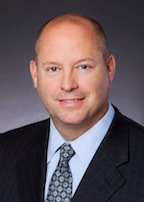
Adam Day is a veteran public affairs executive with extensive experience managing the delivery of municipal services, government relations, community outreach, coalition development and multi-million dollar charitable and media campaigns.
He is currently the assistant tribal manager for the Sycuan Band of the Kumeyaay Nation. He reports to the elected Tribal Council and works closely with other senior executives in providing day-to-day business and policy guidance and long-term strategic counsel. In this role, he helps oversee the management and operation of more than 12 tribal government departments with a combined annual budget exceeding $55 million.
Prior to joining Sycuan, Day served as vice president and general manager for NCG Porter Novelli, San Diego’s largest public affairs firm. In that capacity he managed a number of campaigns for leading San Diego companies.
Before that, Day served as senior public affairs counsel to industry leaders in the fields of high technology, Indian gaming and land development. A highlight of his work was on behalf of SAIC in its successful bid for the County of San Diego’s landmark information technology outsourcing project. The contract, valued at more than $640 million over seven years, was considered the largest municipal privatization in the history of the U.S. at the time.
Throughout his career, Day has served on dozens of boards and committees and currently sits on the Del Mar Fair Board, the San Diego County Planning Commission, Century Club of San Diego, Indian Gaming Local Benefit Committee, and the S.D. County Fire Mitigation Committee.
Suja Juice Co. Attracts Hollywood Investors
Leonardo DiCaprio, Jared Leto and Sofia Vergara



San Diego-based Suja Juice Co., maker of cold-pressured nutritional juices, reported that it has closed another investment round in excess of $20 million with additional investors that include actors Leonardo DiCaprio, Jared Leto and Sofia Vergara. New investors also include Evolution Media Partners, a joint venture with TPG Growth, Participant Media, and Evolution Media Capital.
“As someone constantly on the go, I have come to count on Suja not only to help me maintain my health and energy but to provide a great tasting fun alternative,” said Leto. “I am passionate about discovering brands that I not only actually use and enjoy, but also holistically believe in, and Suja is a great exemplifier of this search.”
Suja was recently named by Forbes as the No. 2 “Most Promising Company” in America, climbing up a spot from its No. 3 ranking in 2014.
Funds from the latest investment round will be used to support the expansion of Suja’s manufacturing facility and its capacity as the company anticipates doubling revenues in 2015.
“Since Suja’s launch in May 2012, the brand has been blessed with an authentic and loyal fan following,” said James Brennan, Suja co-founder. “We are lucky enough that some of these fans happened to be Hollywood’s most respected celebrities and wanted to do more than just enjoy the juice but actually be part of the Suja Juice movement.
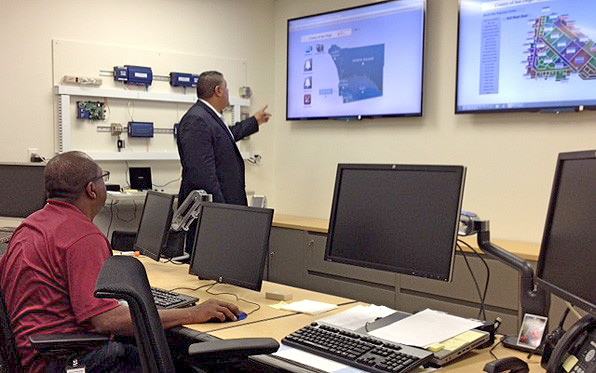
San Diego County’s Smart Building Automation
System Saving Energy and Lowering Utility Costs
The County of San Diego has designed and implemented a new smart building automation system that ties county government’s various facilities together so they can be monitored and controlled remotely from one location. It’s saving energy, lowering utility costs and preventing problems before they occur, according to county officials.
To date, the officials said, the system has saved $58,000 in utility costs at the South Bay Regional Center. Full county implementation could save as much as $1.4 million a year in electrical usage alone.
The county has 550 buildings with 7.2 million square feet across thousands of square miles. They have different stand-alone building control systems for electricity, gas and water at nearly every building. The result is a slow, costly, reactive approach to resolving facility system issues and, ultimately, reduced efficiency, officials said.
“There is nothing in the California public sector, facility management arena that comes close to this,” said General Services Chief of Operations Mike Urquhart. “We are leading the way with an innovative application of existing technology.”
Mission control, so to speak, takes place in what is jokingly called the “Bat Cave” — a small room at the County Operations Center in Kearny Mesa full of computer monitors and screens. This confined windowless area gives a team of two technicians and a supervisor a big picture view of the buildings on board the system. And it also allows them the capability to drill down to the smallest detail.
Technicians can click to a specific building, see the floor plans in 3D and check diagrams of the chilled water, heating/hot water and lighting systems. They can monitor how the individual components are operating, from air handlers down to their air flow valves. Significant measurements are updated every 15 seconds.
Where once a complaint meant calling maintenance, possibly sending someone to the site, finding the problem, diagnosing it, and the actual repair taking many hours if not days, now the Bat Cave technicians can detect where a malfunction is taking place and repair it, either remotely or by contacting the building’s maintenance crew.
The system is still in its infancy in terms of all its capabilities but it’s already attracting attention. The U.S. Navy recently visited the Bat Cave to see how it works and came away with ideas on how it could apply to them.
SDEA Roundtable on ADA
The San Diego Employers Association will stage a Feb. 20 roundtable event on the Americans With Disabilities Act (ADA), which requires employers to reasonably accommodate employees with disabilities.
The event will be from 11:30 a.m. to 1 p.m. at ther SDEA Training Facility, 4180 Ruffin Road, Suite 295, San Diego. The cost is $35 for SDEA members and $45 for nonmembers. To register, call (858) 505-0024.
SBA and Gay and Lesbian Chamber
Target LGBT Business Owners
The U.S. Small Business Administration and the National Gay & Lesbian Chamber of Commerce have launched the first initiative of its kind focused on LGBT business owners.
LGBT Business Builder will bring together expertise and resources from staff at SBA district and regional offices and 38 U.S.-based affiliate chambers of the National Gay & Lesbian Chamber of Commerce, and other resource partners.
“Today’s announcement is about ensuring that entrepreneurs who are gay, lesbian, bisexual or transgender have the support they need to excel. I’m here because we cannot separate the fight for civil rights from the fight for market rights and economic empowerment,” said SBA Administrator Maria Contreras-Sweet. “This agreement is not about what we will do here in D.C., but we will do together in all 50 states to help LGBT entrepreneurs grow their revenues and their payroll.”
Day-long training sessions will occur in the next 24 months for LGBT business owners in Atlanta, Los Angeles, Sacramento and San Francisco. Other cities will be announced in the near future.
The focus on California is especially important in light of a new law that took effect Jan. 1. California public utilities are now required to extend existing provisions granted to ethnic minority-, women-, and disabled veteran- owned business enterprises to LGBT certified business owners. It is believed to be the first bill of its kind in the United States and will serve as a model for similar legislation covering other highly regulated industries and in other states.
Patent Litigation ‘Reform’ Measure
Slammed by San Diego Biotech Groups
San Diego life sciences groups criticized the introduction of patent litigation reform legislation in Washington, saying the so-called Innovation Act will create “additional patent-related uncertainly in the already high-risk life sciences and technology sectors.”
The California Healthcare Institute, BayBio, Biocom and Connect issued a joint statement signed by the CEOs of each organization, Sara Radcliffe, Gail Maderis, Joe Panetta and Greg KcKee. The three San Diego and one Bay Area trade organizations primarily represent startups in biotech and life sciences.
“The legislation introduced this week unfortunately will create additional patent-related uncertainty in the already high-risk life sciences and technology sectors,” the four said in the statement. “We respectfully oppose the Innovation Act in its current form, and look forward to working with the bill’s sponsors to improve the legislation so that it is more supportive of our state’s life sciences innovation ecosystem.”
House Judiciary Committee Chairman Bob Goodlatte, a congressman from Virginia, introduced H.R. 9 on Thursday with Rep. Darrell Issa, a Republican who represents north coastal San Diego and south Orange counties, as a sponsor.
According to Issa, the bill is intended to target “well-funded ‘patent trolls’ who exploit loopholes in our patent system, bullying inventors and small businesses with frivolous lawsuits.”
Issa is an inventor himself with 37 patents, and founded Directed Electronics, the nation’s largest manufacturer of vehicle anti-theft devices.
— By Times of San Diego
San Diego Police to Get Pay Hike
Under Tentative Deal With City
San Diego police will get a pay increase of about 6.6 percent over five years under a tentative agreement that is structured to focus on incentive-based increases and is geared toward officers who reached specific experience requirements.
Mayor Kevin Faulconer announced the tentative agreement on Friday. City officials hope the deal will stem the flood of officers leaving the department for better wages at nearby law enforcement agencies.
The total cost of the contract extension is approximately $92 million over five years, with new costs of $62 million, largely driven by a restoration of holiday pay and an increase in health care, equipment and uniform allowance, with specific incentives for experienced officers and an equipment allowance for new recruits.
“This is an important milestone for our police department,” said Brian Marvel, president of the police association. “For years, our officers have been leaving our department at an alarming rate for greener pastures. With this new agreement, Mayor Faulconer has taken a great step to reverse more than a decade of neglect.”
Personnel Announcements
Rudolph Elected President of
San Diego Bankruptcy Forum

Gary Rudolph, a shareholder with Sullivan Hill, has been elected president of the San Diego Bankruptcy Forum for 2015. The San Diego Bankruptcy Forum is a nonprofit organization of professionals working in the areas of bankruptcy and insolvency. Its membership includes attorneys, accountants, trustees, bankers, real estate professionals, auctioneers, appraisers, consultants and others involved in the bankruptcy and insolvency process.
Rudolph is the current chair of the San Diego County Bar Association’s Bankruptcy Law Section, a member of the National Association of Bankruptcy Trustees and is a past president of the San Diego Receivers Forum.
Jim Hatch Joins CBRE Capital Markets
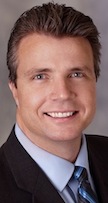
Jim Hatch has joined CBRE Capital Markets’ Business Lending team as vice president. Business Lending is a unit within CBRE Capital Markets that focuses on the owner-occupied and the private capital real estate space. Based in San Diego, Hatch will cover the San Diego region.
Hatch joins CBRE from Commercial Capital Bank, where he was responsible for SBA and commercial loan originations. Previously, he was owner of West Coast Commercial Mortgage Inc., where he spent 12 years originating commercial real estate mortgages.
Eric Banks Reappointed to State
Public Employment Relations Board

Eric Banks, 43, of San Diego, has been reappointed to the California Public Employment Relations Board by Gov. Jerry Brown. Banks has served since 2013. Banks was a partner at Ten Page Memo LLC in 2013 and held several positions at the Service Employees International Union, Local 221 from 2001 to 2013, including adviser, president and director of government and community relations. Banks was policy associate for state government affairs at the New York AIDS Coalition from 2000 to 2001 and held several positions at the Southern Tier AIDS Program from 1993 to 2000, including director of client services, assistant director of client services and case manager. The position requires Senate confirmation and the compensation is $134,591. Banks is a Democrat.
Julie Neidich Joins Pathway Genomics
As the Laboratory Medical Director
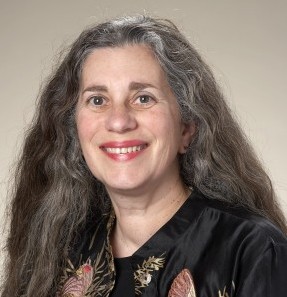
Dr. Julie Neidich has joined Pathway Genomics Corp., a San Diego-based clinical laboratory offering genetic testing, as the laboratory medical director. Neidich comes from GeneDx where she was the clinical director of the Whole Exome Sequencing Program.
Neidich has held faculty positions at Cornell University Medical College and Stanford University School of Medicine, as well as leadership roles at Quest Diagnostics-Nichols Institute and Ambry Genetics. She was the founder of Global TeleGenetics.
Neidich received her bachelor’s at Bennington College and her doctorate from George Washington University. She then went on to receive her pediatrics training at Albert Einstein College of Medicine-Montefiore Medical Center and her genetics training at the Children’s Hospital of Philadelphia-University of Pennsylvania. She a founding fellow of the American College of Medical Genetics and a fellow of the American Academy of Pediatrics.


